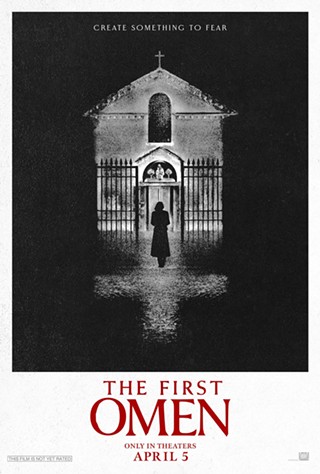The good news is that Lady is not awful. Parts of it are awful. But Shyamalan has to be commended or just stared at for being so relentlessly idiosyncratic. While Lady is highly derivative of many films and stories, it fits into no real genre, and like something by Ed Wood or Herschell Gordon Lewis or José "Coffin Joe" Mojica Marins, it's clearly the work of someone whom somebody, probably himself, considers a genius.
Basically, Lady is an attempt to bring a fairy tale into the modern world. If that was all that Shyamalan was doing, he would have made something like Tim Burton's Edward Scissorhands, which successfully translates the format into contemporary suburbia.
But Shyamalan has a much greater sense of himself than that, so he also explains that Lady is a fairy tale. In this, it becomes a sort of story within a story, and that's where it both succeeds and fails.
Paul Giamatti plays Cleveland Heep, a superintendent at a Pennsylvania residence hotel. Mr. Heep is a sad man, and a lonely man, and he does not like people to swim in the hotel pool after 7 p.m. And yet, someone--or something--is swimming in the pool!
It turns out that it's a beautiful woman whose name is Story. This is a clue that she'll be essential to the story, or that there wouldn't be a story if she didn't show up, or that M. Night Shyamalan can be both pretentious and simplistic at the same time.
Story is played with a blank expression by the translucent Bryce Dallas Howard. If there's one thing that Hollywood movies like The Brother From Another Planet and Starman and E.T. have taught us, it's that otherworldly people with blank expressions are Great Sources of Wisdom.
It's also clear from the many movies and books aimed at teenagers who've just had their first hit of pot while reading Carlos Castaneda that otherworldly people do not use contractions. Shyamalan faithfully follows this convention, but adds two important elements that all future representations of the otherworldly wisdom carrier should abide by: The otherworldly person has incredibly well-shaved legs, and she never wears pants.
In fact, Bryce Dallas Howard's costume throughout this film is a blousy man's shirt with, as one character notes, "nothing on under it!" This speaks volumes about her wisdom and power.
It turns out that this power comes from The Blue World, where Story lives, and it's the job of the residents of the hotel to help her get back there by defeating the scrunt, a dog-like creature that is made of evil and pixels.
What makes Lady both interesting and dull is that the story of how to get Story back to the land of stories is told mostly in exposition. Story utters the word "Narf" in her sleep, and Cleveland just happens to know an old Korean woman who knows a fairy tale about Narfs.
This fairy tale contains everything Cleveland needs to know, but it obviously gets told in dialogue, so about a third of the movie is people standing around and explaining stuff. The other problem is that the task set before Cleveland is tremendously artificial: He must gather a Symbolist, a Guardian, a Healer and a Guild. Setting up a quest like this may be a standard fairy-tale motif, but the modern approach in narrative is to have the goals of the protagonist unfold over the course of the story so that there's a more natural development.
And this is where Shyamalan's script becomes clever, because after he's laid out the artificial quest constraints, he plays with them in a way that could only be described by what the fan-boys call "a spoiler." So I won't say, but I will say that the tedium of much of the beginning of the film pays out in the end, and the final segments are fairly rewarding.
Unfortunately, you'll guess a lot of the mysteries before Cleveland figures them out, but the way Shyamalan twists them is still clever.
His way of being both pretentious and simplistic may well appeal to children; I can't be sure, as I didn't have my test-children with me, but it seems like an intelligent 12-year-old would really enjoy this.
Kids also won't mind the acting styles that Shyamalan favors: The characters are all either stiffly and grandly emotive, or broadly comic. In the latter category are a stereotypical room full of stoners, a nagging Jewish wife and a creature that just doesn't exist in the real world: a pretentious, simplistic and self-important film critic (Bob Balaban, who's perfectly hilarious in the role). See how clever Shyamalan is? When critics dis' his film, he can note that he includes a negative caricature of a critic! Ha! Funny!
But Lady may well be worth seeing if only for its oddness and occasional flashes of (self-aware and self-congratulatory) originality and brilliance. The cast is a mixed bag, but for each bad performance by the likes of Bill Irwin, Jeffrey Wright (who's usually great) and M. Night himself, there are some well-played bits by Balaban and Giamatti (when he's not doing a silly stutter).
It lacks the cinematographic richness of Shyamalan's last film, The Village, and the subtle moodiness of his Unbreakable, but Lady in the Water is still a highly original work, and in a time when films are expected to follow strict genre rules, that alone is enough to make it somewhat praiseworthy. In fact, I hope that the ad execs at Warner Bros. use "Somewhat Praiseworthy!" as a quote in their commercials, because it really sums up this movie.










